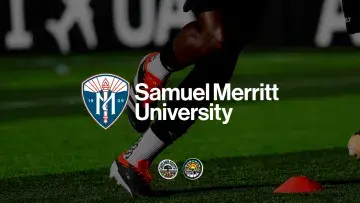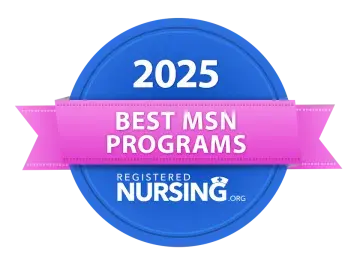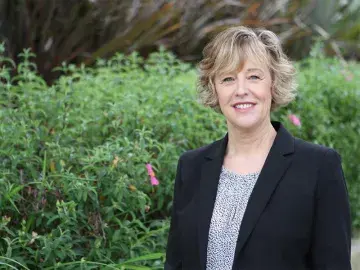ABSN Students at San Francisco Peninsula Campus Building Healthier Communites
Every Thursday morning, a group of older adults living at a MidPen housing facility in Mountain View gather in the first-floor dining room to exercise. A few arrive with the help of a walker, some by cane, and others on two spry feet. 
During a recent session, Judith Nolan, a student at SMU’s San Francisco Peninsula Campus (SFPC), encouraged the group as she led their routine over the riffs of rock music.
“Reach as high as you can, and then sttrrretttcchh those arms back… if you can.”
The comment got a warm laugh from the residents, and they carried on for another 15 minutes before they shared the rest of the morning with a visiting cohort of SMU students. The students made crafts with the seniors, cooked lunch, inquired about the residents’ grandchildren, and provided free blood pressure screenings.
“I like working with our clients here because we’re focusing on health and wellness instead of illness,” Nolan said. “We’re in preventive mode. We’re not in a hospital trying to fix things after they’re broke. We’re working with a community to keep it healthy today, and to help sustain it into the future.”
Like all nursing students at SFPC in San Mateo, Nolan is enrolled in the Accelerated Bachelor of Science in Nursing program (ABSN) — a 12-month program of intensive nursing courses and clinical education.
For many students like Nolan, who already have a bachelor’s degree in a non-nursing field, the ABSN is attractive because it’s a one-year fast track to becoming a registered nurse. It also allows for a mid-career change without having to return to school for several years.
“I was in the pharmaceutical industry for 13 years,” Nolan said. “Healthcare is an important field, and one that’s changing. It’s moving out of the hospital and into prevention, and I wanted to be part of that change.”
With such an accelerated timeline, the opportunities for students to work in their community come quick and often. ABSN students complete five preceptorships in the fields of mental health, medical and surgical nursing, maternity, pediatrics, and community health.
The students who visited the MidPen facility this spring were on their community health rotation.
“Working with a vulnerable population is important for students because they get to see people outside of an acute care setting,” said Associate Professor Loretta Camarano, PhD, MA, RNC. “If they treat a senior client in a hospital one day, now they’ll know what they’re sending them home to. They know what their client’s lives look like outside of a hospital, and they’ll be better prepared to give them better care.”

SMU has particularly close ties with the residents at MidPen’s Ginzton Terrace facility in Mountain View. It all started in 2011 when a cohort of students offered an early morning exercise class to the community. A dozen residents showed up, but only a few spoke English. Most spoke Russian, Cantonese, and Mandarin, and a few others spoke Korean.
The residents bonded and after the 10-week SMU-led class ended, they agreed to continue meeting each week in the courtyard. And to this day, the same group exercises together and the residents take turns facilitating the class.
“One day you’ll hear them counting their stretches to 10 in Russian,” said Thuy Le, the manager for Senior Services Programs at Ginzton Terrace. “The next week they’re counting in Korean. It’s amazing they keep at it, but it’s what we like to see our residents doing: Getting out of their rooms and staying fit.”
“The students give them the social interaction they need,” Le added, “to maintain their happiness and quality of life.”
For SMU student Nolan, the hands-on experience at MidPen led to a few epiphanies. She might one day like to work with older adults.
Most of all, she’s impressed by her fellow students. 
“In my last profession, I hadn’t worked on big teams,” she said. “Give me a project and I’d do fine. But in healthcare, when you’re working on a high-functioning team, you can see the change in a community and how it impacts people’s lives. You can see how much you can accomplish together. You can see that good medicine is really good teamwork.”


